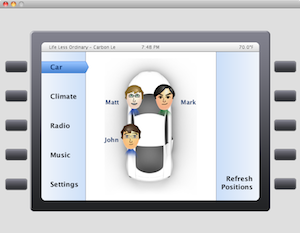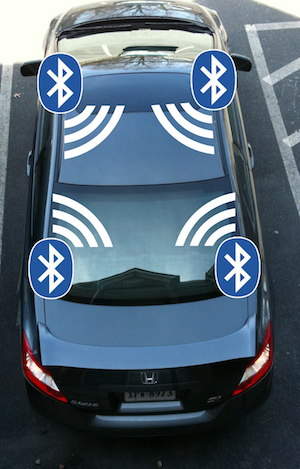UVa Undergraduate Thesis
The University of Virginia's Engineering School is unique because it is the only undergraduate engineering program in the nation to require a thesis for graduation. The thesis project has two components: a technical report and social/ethical impact research paper. For technical research, computer science students can choose to work with a professor on his or her research or propose a completely new project based on their own interests. I chose to do the latter and completed an independent project with fellow computer science student Matt Beattie. My work is summarized below, but if you would like more information on either topic, please consult my full thesis portfolio (PDF).
Technical Research on Bluetooth Location Tracking
We developed a highly personalized car system that dynamically adapts a car's environment to its current occupants. Each passenger creates a profile of his or her environment preferences (indoor temperature, favorite radio stations, favorite music artists, etc.) and is identified by the Bluetooth signal of a registered mobile phone. As passengers enter or exit the vehicle, the system will adapt its choices on the fly to accommodate the current passengers.
An automatically-adapting car system primarily increases the safety of everyone in the car, but also improves user satisfaction by making choices that please the most passengers. When choices are made without input from the driver, he or she can keep focused on the road instead of manipulating the dashboard controls. Even if our system only decreases accident rates by a single percentage point, it will save many hundreds of lives simply because of the very large amount of time the average person spends in the car each day.
The main display of the system was created with the Java Swing framework and talks to a MySQL database that contains each passenger's profile. Bluetooth sensors placed at the four corners of the car are used to triangulate each passenger's phone and determine his or her current seat. During our informal testing we were able to achieve 100% accuracy for sensing the presence of a phone and roughly 90% accuracy for correctly determining the seat.
Social and Ethical Impact of RFID-enabled Documents
My ethical research concerned a slight twist on location tracking; Bluetooth and mobile phones are replaced with Radio Frequency Identification (RFID) chips and the new U.S. e-passport. The switch to an electronic passport was primarily driven by the desire to reduce counterfeiting and improve wait times at Customs or border crossings by using wireless technology to uniquely identify the document. The downside to this wireless capability is that an RFID tag is always transmitting its identity, which means that it has instantly become a very effective tracking device. RFID chips are a direct threat to privacy, and safeguards must be put in place to protect individuals from unintentional disclosure of private data via RFID tags.
RFID-enabled U.S. passports provide an excellent framework to analyze areas where privacy or security is at risk because of the numerous proof-of-concept attacks that already exist. Researchers have used the knowledge learned from these attacks to craft defensive RFID-blocking technology, draft proposed privacy legislation, and recommend steps everyday citizens can take to protect themselves.
The issues raised by e-passports will only become more important as time progresses because their adoption by the U.S. will encourage other nations to follow suit to remain competitive and secure. Once the technology is deployed, it must withstand 10 years of sophisticated attacks supported by an ever-increasing amount of computing power. If privacy safeguards are not proactively applied, the personal data of millions of Americans will be stolen in the coming decade.



